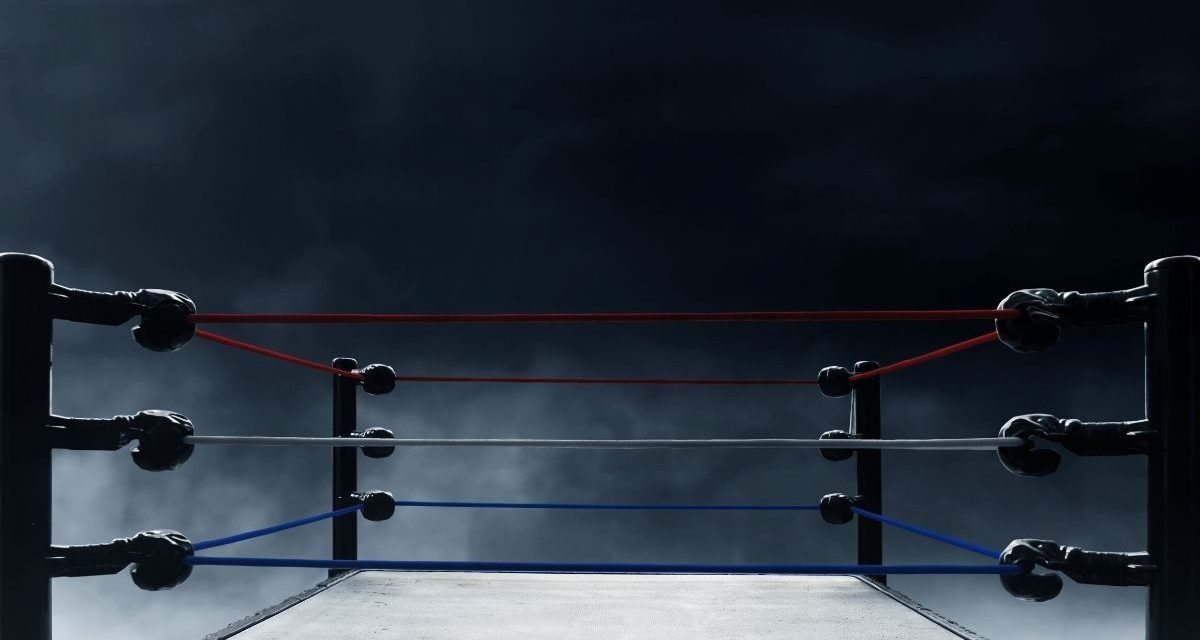There have been countless father-son tag teams over the eons, but the first great team was Gino Garibaldi and his son Leo. With Leo’s death on Monday in Las Vegas, wrestling loses not only another link to its rich past, but also one of the most-respected booking minds in history.
Born July 19, 1929, it seemed inevitable that Leo would find his way into the family business. After all, not only was his father Gino (Sam Curcuru) a pro wrestler, but four of his uncles were as well: Chick (Charles, who wrestled the longest and died in the ring in 1961), Tony (a lightweight), Joe (a short career), and Ralph (the best wrestler of the brothers).
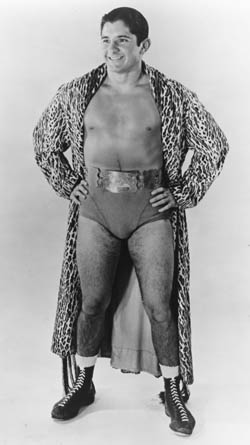
Leo Garibaldi
“I had no desire to be a lawyer or a doctor or anybody. I really didn’t know what I wanted to do in my life. So it was finally thrown right in my face,” Garibaldi told this writer in 2004.
Being the son of a wrestler wasn’t easy, he said. “I had a father who was a champion wrestler, and I was not. I was a little kid. My dad was very, very popular. He went on to a lot of different bookings he had all over the country. And I couldn’t do it because I was 15, 16 years old. I went to the New York Military Academy where I could be stashed away, and my father could see me when he had time. While there, I didn’t know a thing about wrestling. They had a wrestling team and we were just a few miles from West Point, and they were our major competitors. I learned a lot from those guys. I was a high schooler and I became the captain of the team and did very good.”
Like many a wannabe pro wrestler, Leo was in the right place at the right time for his debut. “One day, I was on a trip with my dad, and there were some other guys in the car, wrestlers. A wrestler didn’t show up and a guy said they couldn’t find anybody to take his place. Somebody or a promoter, asked Gino if he’d like to put me into the graveyard. So that was it. They gave me a nice little sum of money. The crowd was screaming and hollering and I was 18 years old. I was lucky enough to win and went on from there to make up my mind that was what I wanted to do, which was crazy. It’s just hell on your body. It’s just the worst thing you can do is be a professional wrestler or a boxer. When you’re 18 years old, you can take a lot of punishment. But then if you stay too long, you’re really going to get hurt.”
Billed as “The Teenage Idol from California,” the 6-foot-1 Leo would compete against all the greats of the 1950s — Gorgeous George, Red Berry, Freddie Blassie and Danny McShane.
Teaming with his father was a natural fit.
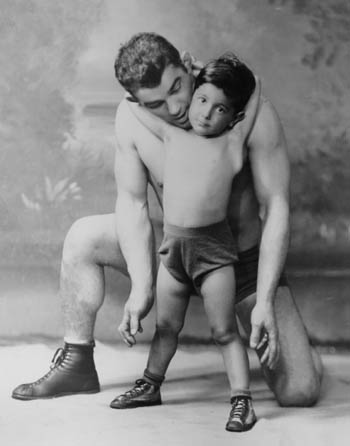
A six-year-old Leo with his dad in 1935. – photo courtesy Leo Garibaldi
“You’d kill yourself to not hurt your partner if he’s your father, which mine was. And he would do likewise. That’s the secret of the success,” Leo explained. “Naturally, we would do anything to be sure that he doesn’t get hurt; that’s number one. Number two is hurt the other guy!”
Though difficult to document, it is believed that one of the first big father-son tag team bouts came in 1950, with Gino and Leo Garibaldi taking on Brother Jonathan and his son Don Leo in San Francisco.
“They were good, father and son,” recalled Don Leo Jonathan. “Leo was a pretty flashy guy. He’d get up and do the stuff. The first ever father and son tag team match where they had two father and son teams was my dad and I against the Garibaldis in the Winter Garden in the fall of 1950. … That was the first that anybody could remember where there was an actual father and son tag team wrestled each other.”
In a 1948 program from California, Gino Garibaldi talked about his son. “The boy can out-wrestle me right now,” Gino is quoted as saying. “He’s wrestled ever since he was big enough to twist his legs around my ankle, and he really loves the sport. His youth seems to be against him out here, as the promoters say, it’s risky for a boy so young to meet any of the hardened villains out here.”
Leo would rise to become the World Junior Heavyweight champion out in California in 1950, beating Count Billy Varga, and losing to Baron Michelle Leone.
After four years away from the ring while in the U.S. Air Force during the Korean War, Leo returned to the sport he had grown to love in 1955.
He was an absolute star in California.
“I had no ending of movie stars come and see me, sit with me, talk to me. They’re to find out how I can do this and get the people so excited,” Leo explained. His biggest fan club, Leo’s Loverettes, was based in Long Beach, Calif.
His talent extended beyond wrestling too, recalled former world champion Nick Bockwinkel. “Leo could play the guitar, and he could sing. God, he was so cornball, but it was the beginning of television and they were on TV seven days a week in Los Angeles. At that time, if you said to anybody in the Los Angeles area in early ’50s, ‘What name do you know real well? Give it to me!’ They’d have to say Leo Garibaldi because he was on TV seven days a week.”
Garibaldi laughed when asked about playing the accordion on TV, and explained how it lead to something bigger. “I was hired to go lead a group of musicians. I said, ‘No, I don’t want to go do that. I play the accordion and that’s all.’ This band was terrific, a big, huge band, and I didn’t want to go looking like an asshole, not knowing too much, not always giving it a try.
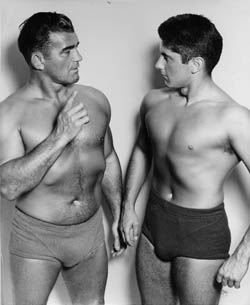
Gino and Leo Garibaldi. – photo courtesy Leo Garibaldi
“They had a 21-piece band and they were calling it Leo Garibaldi’s Orchestra, where I could barely get around a little bit with my accordion. I told this to the guys. They said, ‘Oh, we know Leo. We have a zillion guys that can’t play anything but if they can sell some tickets, why we’ll be right behind him, we’ll make so much noise that the fans will just take care of it.’ That’s how I learned to be a showman.”
It wasn’t just his looks in the ring either; Leo Garibaldi was a memorable competitor as well. “The thing that jumped out at me then was that Gino would give the good-looking, young son the hot comeback, and Leo would light up the building,” said wrestler/announcer/trainer Les Thatcher. “He just had so much fire on his comebacks.” Mad Dog Vachon remembers Leo’s zip as well. “I never saw a guy who had so much energy. He never would stop. Sometimes he’d go 30 minutes to a draw, semi-final, soaking wet, but he never stopped for two seconds in the ring. He was a buzzsaw.”
When Leo suffered a broken shoulder during a bout in September 1960, he was ordered to hang up his wrestling boots for good under doctor’s orders. The president of the National Wrestling Alliance, Sam Muchnick, signed Leo up as his top “troubleshooter” and personal representative. Leo would serve as a referee in big title matches, and would be used by promoters on TV to make NWA-level announcements.
However, Leo Garibaldi’s mind was racing and he needed to use it for the good of wrestling, and so he was tapped to be a booker. His first stop was Austin, Texas.
“Louie Tillet was my biggest star in Texas,” recalled Garabaldi. “I gave him some shit to do and say when he was on TV. That was the biggest thing then, what you say on TV. You have to say things that will really please the guys or really hate them.”
Tillet’s small size was never a detriment, said Garibaldi, even against brutes like Bull Curry. “Small, it doesn’t mean anything in wrestling. There are small guys that can eat you alive. That’s the truth.”
“Leo was very, very creative. He had good ideas,” said Tillet. “Some of them, maybe, were a little overboard. Some of them, I went with it, like in Austin, when we started to build that. He had me in a match with Tony Borne where the loser was going to be tar and feathered — and I did it! They tar and feathered me. Now, we wouldn’t have done that in just any town.”
Up next, Garabaldi was tapped to go to Atlanta and revive the territory, following Tillet into the territory. “He had been expected to fail, because he was actually failing in Texas,” explained Paul “Butcher” Vachon, who would benefit from a huge push in Atlanta under Garibaldi. “He had been successful running Tyler, Texas, and Austin, Texas, but one town was far away and he neglected it, so it dragged the one town down and dragged the other one down. So they said, ‘There’s a guy spinning his wheels. Let’s get him.’ … He surprised them all. I just happened to be there on the spot.”
The Vachons — Paul, Maurice “Mad Dog” and their worked brother Stan (Eric Pomeroy) — had a massive run in Atlanta, particularly against the Torres brothers. “He was a genius. What he did in Atlanta was unbelievable, incredible. He had had so much flare for booking,” said Mad Dog. “He knew exactly what to do with what he had in front of him. He knew exactly what to do and the right time.” Pomeroy concurred. “Leo was really a good guy in the office,” he said, and was especially good at the details of booking.
It was in Atlanta that a young, second-generation wrestler first got a chance to work as a bad guy, thanks to Garibaldi. “He was the first person to have the privilege, so to speak, as we say, allow me my entry into the world of being a heel,” said Bockwinkel. “I’d always worked babyface until I went to Georgia in 1968. I went down there and Leo Garibaldi was the booker, and I said, ‘Leo, I want to work heel.’ ‘Okay, c’mon in.’ And that was the beginning of my turn, to so speak. I had a nice run.”
For a time, Garibaldi was also a co-booker in Florida under Eddie Graham. “We were doing terrific, terrific wrestling there,” he said. He also booked the Carolinas for a time.
Garibaldi tried his best to explain why he thought he was successful as a booker. “With my experience, I was able to see people that had what it took. I would talk to them. I would take them out of the dressing room and listen, and show them things,” he said. “I can look at you and know if you’re real, or just passing through.” He also wasn’t scared of making a big decision. “I knew how to make people feel like a king, and then kill them.”
In an interview on the Georgia Wrestling History web site, “The Assassin” Jody Hamilton confirmed Garibaldi’s enjoyment of talking angles. “We used to sit around and discuss these things when Leo was the booker. We’d sit and talk about this stuff and toss around ideas for hours.”
Red Bastien said at Garibaldi was “an excellent matchmaker. He had a knack for recognizing guys who looked like they might do well together.”
For a time, Leo and his wife June lived in Australia, where he was a part owner in the wrestling promotion. When they moved back to the United States, they bought a home in California, and Leo helped the Olympic Auditorium Wrestling promotion in Los Angeles, which wasn’t at the top of its game.
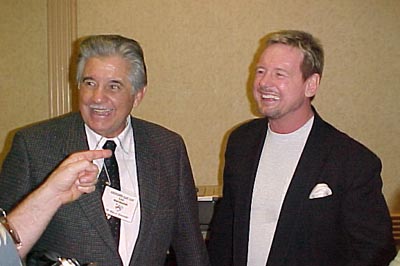
Leo Garibaldi and Rowdy Roddy Piper share a laugh at the Cauliflower Alley Club reunion in Las Vegas in February 2001. Photo by Greg Oliver
It was Garabaldi who first saw money in Roddy Piper.
“I was the booker in Los Angeles. I was out of wrestlers,” he explained. “Then I heard him [Piper] talking to somebody, and he was asking how it was. He was just starting. So I booked him in a match, and I just gave him to somebody to eat him up. But the guy would not be eaten up. He was playing the bagpipes, he was jumping around and flashing his skirt. The people went crazy. They didn’t know to hate him or to love him because he is a loving guy, a great guy, and he’s doing what it takes.”
The wrestling business was tough on Leo. He had two knee replacements, two hip replacements, and a shoulder replacement. “It’s lucky that I saved me some money because they don’t give you any. You just go, they pay you, and that’s it,” he lamented.
After getting out of wrestling, for a time Garibaldi worked in a jewelry store in Las Vegas.
His memory started to fail him in the last few years.
“But for some reason, I can remember every match I’ve ever been in,” he said in 2006. “When we get together with the guys, that’s all we do: ‘How about that?’ ‘I didn’t know that.’ That’s the way it was. We try to remember the good times, and the bad times, we try to remember getting the shit beat out of us.”
Leo Garibaldi died Monday, May 12, 2008, at his home in Las Vegas, with his wife June by his side, from complications from Alzheimer’s Disease. Funeral arrangements are not known at this time.
Greg Oliver is thankful for the help that Leo Garibaldi provided for The Pro Wrestling Hall of Fame: The Heels (with Steven Johnson) and The Pro Wrestling Hall of Fame: The Tag Teams. Greg can be emailed at goliver845@gmail.com.
